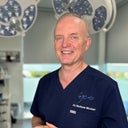Is getting a MRI every 2 years to check on silicone implants really necessary?
I am considering getting breast implants and I am leaning towards getting silicone implants instead of saline, but ultimately safety is the most important factor for me. I know the FDA recommends getting a MRI every 2 yrs, is that really necessary? I would rather not be exposed to the radiation from a MRI every 2 yrs and they are expensive. Can I just get an MRI if I detect anything might be wrong with my implants?









